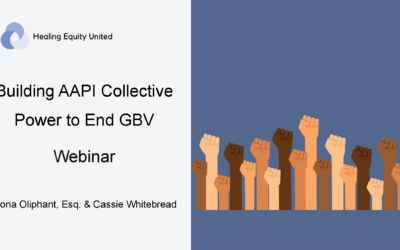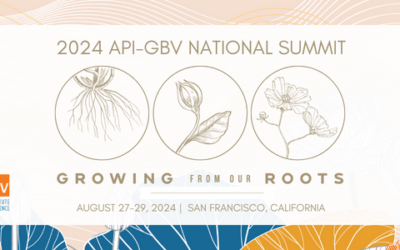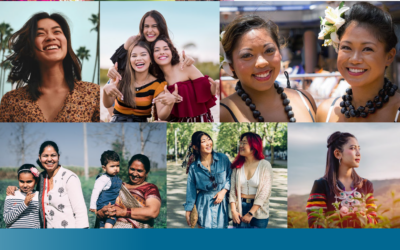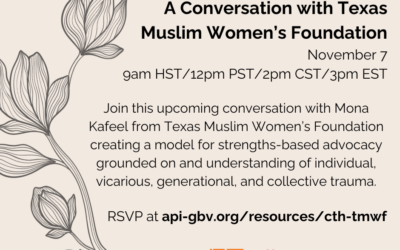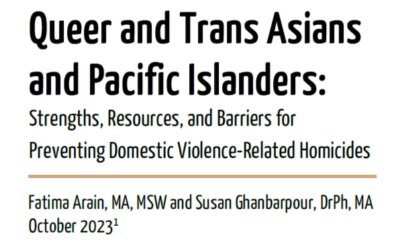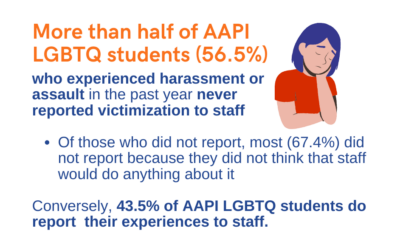Female genital mutilation or cutting (FGM/C) is a reality for many women and girls across different communities in the United States. Yet, for centuries, FGM/C has remained a hidden tradition. It’s often practiced by women to women, and girls are raised to believe they must remain silent about what they underwent. Silence is an endemic or inherent part of this type of gender violence that can lead to lifelong physical and emotional health consequences. At the core of providing better prevention, protection, health and social support services for women and girls is stronger data, enhanced research, and community engagement. Join Sahiyo, the Asian-Pacific Institute on Gender-Based Violence, and the U.S. End FGM/C Network for an exploration of FGM/C, its connection to gender-based violence, and how COVID-19 has impacted the movement to abandon FGM/C in the US.
Search Resource Library
Resource Categories
Abusive International Marriage
Advocacy for Muslim Women
Asian Pacific Islander Demographics and Census Data
Asians and Pacific Islanders
Child Custody in Domestic Violence Cases
Community-Based Participatory Research
Community Organizing
Culturally-Specific Advocacy
Culturally-Specific Community & Systems Engagement
Culture & Gender-Based Violence
Domestic Violence
Elder Abuse
Ensuring Access to Domestic Violence and Sexual Assault Survivors
Featured
Forced Marriage
Gender-Based Violence
Gender-Based Violence Worldwide
Gender Democracy Vs. Gender Inequality
Glossaries
HIV and Domestic Violence
Homicide
Immigration
Innovative Strategies
Language Access, Interpretation, and Translation
Language Access Hub
Language Access Plan
Language Access to Language Justice
LGBTQ Intimate Partner Violence
Lifecourse Violence and Help Seeking
Limited English Proficient (LEP) Survivors
New
News and Events
Our Analysis
Pacific Islanders
Patriarchy & Power
Refugee Survivors
Research and Data
Sexual Violence
Teen/Youth Dating Abuse
Trafficking
Trauma-Informed Care
Trauma Care Practices
Uncategorized
Updated
Working with Interpreters
Resource Tags
Abuse by In-Laws
Attitudes towards Abuse
Bhutanese
Bibliography
Blanketed by Blame
Cambodians
Child Custody
Child Marriage
Children Exposed to Violence
Child Welfare
Chinese
DMST/CSEC
Ethnic-Specific Factsheets
Evidence-Informed Practice
faith-based
female genital mutilation/cutting
Filipino
Gender Democracy
Health related
Help-Seeking
highlights
Historical Trauma
Hmong
Housing
Indian
Interpretation
Japanese
Korean
Koreans
Language Access Tipsheets
language justice
Legal
Lifecourse Violence
Marriage & Divorce
National Summit
Native Hawaiians
Nepalese
Pacific Islanders
Pakistani
Program Design
South Asian
Stalking
VAWA
Victim-Blaming
Vietnamese
Resource Types
Recent Resources
- Critical Intersections of FGM/C: The Value of Intersectionality in Cross-Collaboration
- API-GBV Applauds the Revisions to Collecting Federal Data on Race and Ethnicity Statistical Policy Directive No. 15: Standards for Maintaining, Collecting, and Presenting Federal Data on Race and Ethnicity
- Building AAPI Collective Power to End GBV
- 2024 APi-GBV National Summit: Growing From Our Roots
- Connected and concerned: Online sexual harassment of teenagers of Asian descent on dating platforms

